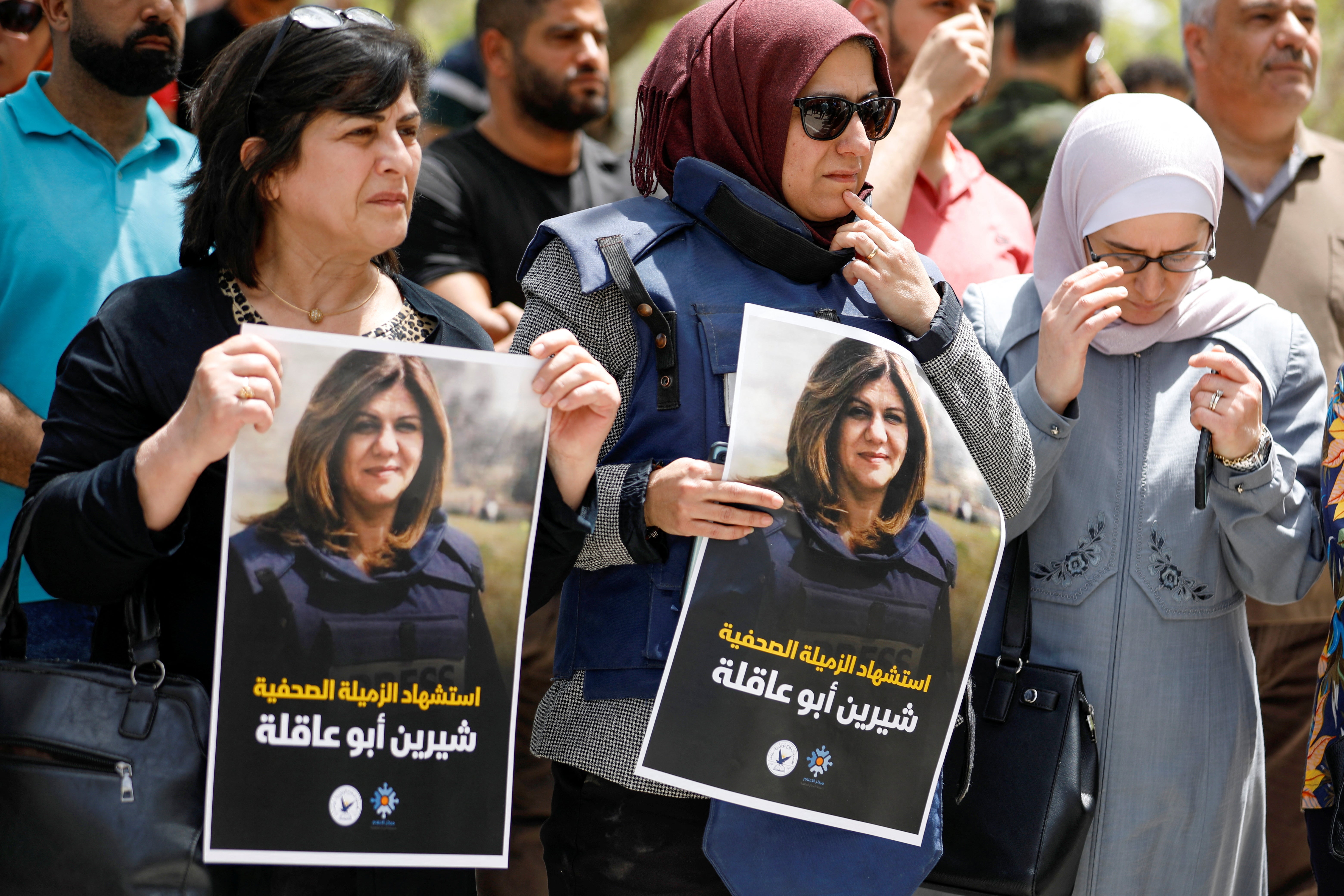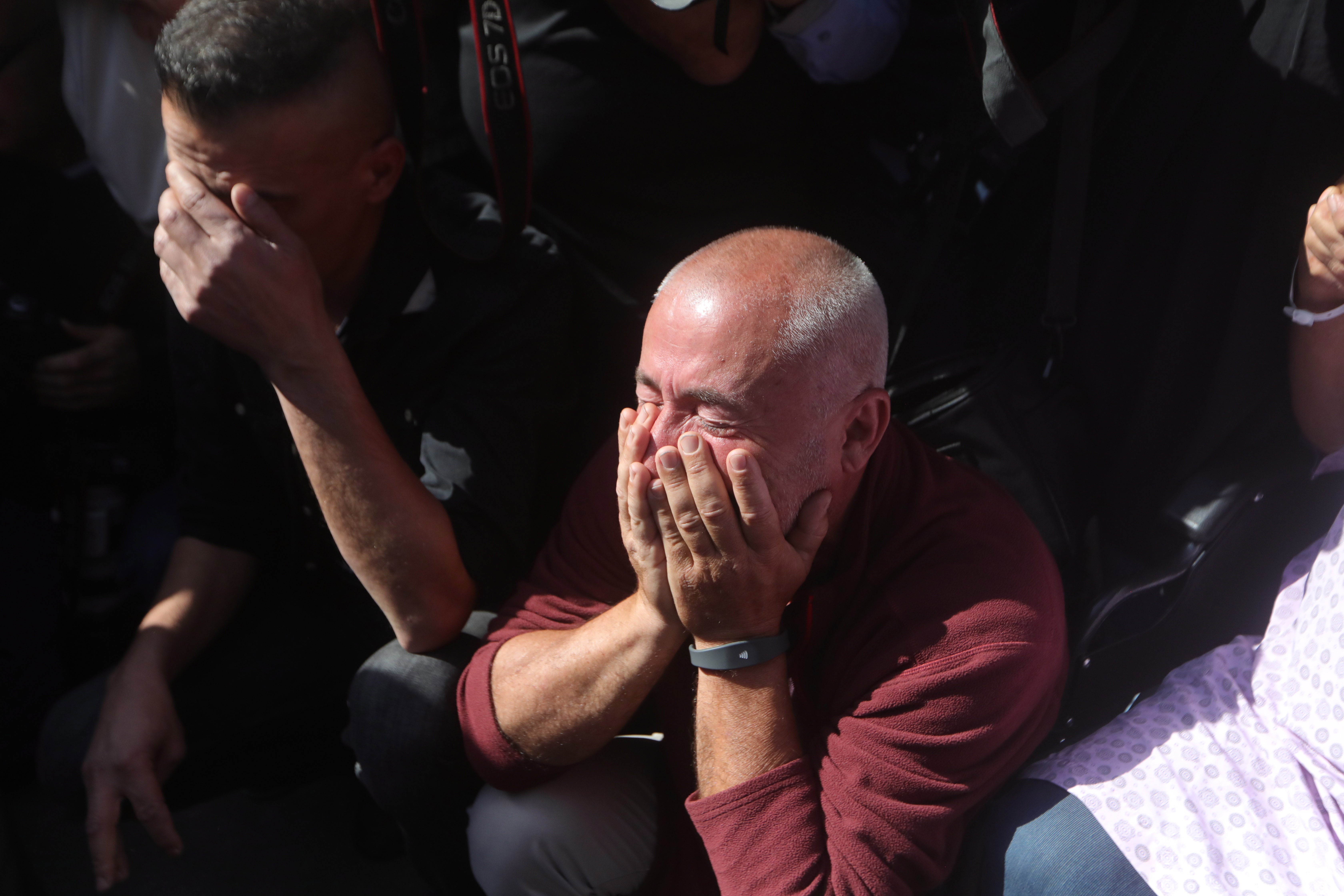The ‘voice of Palestine’ gunned down: How Shireen Abu Akleh fell victim to the conflict she covered
Her death is already sending shockwaves across the Middle East and Israel

Your support helps us to tell the story
From reproductive rights to climate change to Big Tech, The Independent is on the ground when the story is developing. Whether it's investigating the financials of Elon Musk's pro-Trump PAC or producing our latest documentary, 'The A Word', which shines a light on the American women fighting for reproductive rights, we know how important it is to parse out the facts from the messaging.
At such a critical moment in US history, we need reporters on the ground. Your donation allows us to keep sending journalists to speak to both sides of the story.
The Independent is trusted by Americans across the entire political spectrum. And unlike many other quality news outlets, we choose not to lock Americans out of our reporting and analysis with paywalls. We believe quality journalism should be available to everyone, paid for by those who can afford it.
Your support makes all the difference.She covered the most persistently important story of the Arab world for the most widely watched channel in the Middle East.
On Wednesday morning, Shireen Abu Akleh fell victim to the very same conflict between Israelis and Palestinians that she had been chronicling for Al Jazeera, shot dead under still-murky circumstances as Israeli soldiers conducted a raid on the West Bank town of Jenin.
The death of the 51-year-old, Jerusalem-born Palestinian American is already sending shockwaves in Israel, the Middle East and across the world, and will likely draw more attention to the unsettled and lingering conflict at a time when it has receded from view.
Over the past quarter-century, Abu Akleh became a regular presence in homes, cafes and offices across the Arab world, as well as more broadly through Al Jazeera’s English-language channel, the globe.
“She was definitely the voice of Palestine in every Arab home,” one international journalist said in an interview.
Her death by a gunshot to the head Jenin is already complicating an ongoing political crisis in Israel, and has prompted calls for answers by the United Kingdom and the United States.
“I encourage a thorough investigation into the circumstances of her death and the injury of at least one other journalist today in Jenin,” Tom Nides, the US ambassador to Israel, wrote in a tweet.
The news of the killing prompted Israel’s United Arab List to delay an announcement on whether it would remain part of Israel’s governing coalition or allow it to lose its slim majority. Palestinian leaders, Al Jazeera, Qatar, where the broadcaster is headquartered and NGOs, have all blamed Israel for the killing, though Israel insists that Palestinian gunmen likely shot Abu Akleh.
The veteran journalist, known for her cool demeanour and professionalism, and her team were setting up to cover live, ongoing Israeli raids on Jenin when one of her colleagues, Ali al-Samudi, was suddenly shot in the shoulder, according to accounts collected by Palestinian journalists.
“There were no clashes at the moment,” said Mohammed Daraghmeh,
Palestine-based bureau chief for Asharq, a United Arab Emirates news outlet, said: “Ali fell and he was shot again in the back. At this moment Shireen was screaming, ‘Ali was shot! Ali was shot!’”
Heavier shooting then erupted. Video posted to social media showed panicked journalists screaming for help as automatic weapon fire sounded in the distance. “Another journalist who was next to her told me that lots of gunfire had come to the scene, and Shireen fell,” Mr Daraghmeh recounted. “He tried to reach for her but she wasn’t moving.”
Video showed what was said to be Abu Akleh’s lifeless body lying on the ground. Journalists covering the raid began screaming for ambulances. The Palestinian Health Ministry confirmed Shireen Abu Akleh was hit in the head by gunfire. Mr Samudi remains in stable condition.
Israeli forces said they were met by massive gunfire and explosives during the raid and responded by opening fire. "It appears likely that armed Palestinians, who were firing indiscriminately at the time, were responsible for the unfortunate death of the journalist,” Prime Minister Naftali Bennett said.
But both Palestinian officials and Al Jazeera have blamed Israel for shooting the journalists, who wore blue helmets and body armour denoting them as members of the press.
“It’s clear they were shot from the Israeli soldiers’ side,” said Mr Daraghme. “There was no threat of any kind to soldiers. There was no crossfire, and they were away from the soldiers.”
Al Jazeera called the killing “blatant murder, violating international laws and norms” and accused Israeli forces of having “assassinated” Abu Akleh “in cold blood.” It called on the international community to hold Israel accountable for the death
“Al Jazeera holds the Israeli government and the occupation forces responsible for the killing of Shireen,” it said in a statement.
Israel’s foreign ministry released video footage showing what it described as Palestinian gunmen in Jenin announcing they had shot an Israeli soldier, but noted that no Israeli soldiers had been shot during Wednesday’s encounter in Jenin. Israel has called for a joint investigation into the death, welcoming a joint autopsy to identify the round that killed her.

“There are indications that Ms Abu Akleh was killed by Palestinian terrorist fire,” the foreign ministry statement said. “Israel will be conducting a thorough investigation. We call on the Palestinian Authority to cooperate with said investigation to get to the truth.”
Mr Daraghmeh, who was a close friend and colleague of Abu Akleh, described her as zealously committed to her work. A Palestinian Christian, Abu Akleh never married and leaves behind no children. After earning a degree in journalism from Jordan, she moved back to Jerusalem and got to work.
“I used to call her a nun who devoted her life to journalism and high values,” he said.
Her years-long coverage of the Palestinian-Israeli conflict for the most widely watched pan-Arab satellite channel, and its English-language affiliate, made her a brand name across the region.
During a trip to Sudan once, Mr Daraghmeh showed a picture of himself with Abu Akleh, and was told by young journalists and journalism teachers that she would be mobbed in the streets as a celebrity if she ever made it to Khartoum.
“Everyone in the Arab world who followed the Palestinian conflict would see her coverage,” he said.



Join our commenting forum
Join thought-provoking conversations, follow other Independent readers and see their replies
Comments